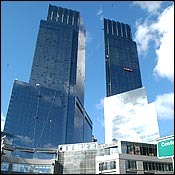
Time Warner, $82 billion
Brands cohabitating uncomfortablyCartoon Network with CNN, Sports Illustrated with AIM, Harry Potter movies with Internet phone service. Plus: Book-of-the-Month Club.
Case For bust-up
Five years after the ill-fated marriage with AOL, Carol Icahn and other disgruntled shareholders are pushing for the company to spin off or sell the suddenly valuable unit.
Possibility of split-up: ♦ ♦ ♦
Now-ironic executive quote on the value of conglomerization
“I have to say, and this is not an arrogant statement, the concept of putting these two companies together is profound.”—Ex-CEO Gerald Levin.
Who wins if it splits
Icahn, who has amassed a significant stake in the company, would benefit greatly from the separation. Winning would make the media overlook his faltering investment in Blockbuster and make other CEOs stand up and take notice.
Interpublic Group, $4.4 billion
Brands cohabitating uncomfortably
Eighty or so advertising, marketing, and PR companies, handling everything from Old Navy to John Deere, Verizon Wireless to Johnny Depp’s publicity.
Case for bust-up
A case study on how not to execute roll-up. Insatiable appetite for acquisitions in the nineties led to accounting problems, big losses, executive turnover.
Possibility of split-up: ♦
Now-ironic executive quote on the value of conglomerization
“Again and again, I’ve been asked, ‘Does the holding-company model make sense anymore?’ I emphatically believe that it does.” —Co-chairman David Bell.
Who wins if it splits
Blue-chip clients who were never sure which sister ad agency was producing ads for their rivals. Comparatively healthy holding companies like Omnicom Group and WPP Group that may want to acquire more shops.
Citigroup, $234 billion
Brands cohabitating uncomfortably
Downscale credit cards and upscale corporate advisory (Smith Barney) huddle unwillingly under iconic umbrella.
Case for bust-up
Sandy Weill’s financial supermarket unloaded Travelers Insurance earlier this year. Regulatory troubles have shackled its expansion; stock is flat.
Possibility of split-up: ♦ ♦
Now-ironic executive quote on the value of conglomerization
“What used to be a conflict is now a synergy.” —Then–Salomon analyst Jack Grubman on investment banking and stock brokerage under the same roof.
Who wins if it splits
Jamie Dimon. The former Citigroup heir presumptive was exiled to Chicago after a falling-out with father-figure Weill. Now he’s czar of JPMorgan Chase, which would become the biggest and baddest supermarket around.
Altria, $152 billion
Brands cohabitating uncomfortably
Marlboros, Oreos, Sanka, Kraft cheese, Grey Poupon, Kool-Aid, Parliaments, Lunchables. Basically the whole bodega.
Case for bust-up
Execs have long wanted to separate the litigation-threatened-but-high-margin cigarette business from the food companies.
Possibility of split-up: ♦ ♦ ♦
Now-ironic executive quote on the value of conglomerization
“We are delighted with Kraft, and we’re going to keep it in our portfolio.” —Ex-CEO Geoffrey Bible (when the company was still called Philip Morris).
Who wins if it splits
Kraft CEO Roger Deromedi and his noncarcinogenic staff, who will no longer have to fret about smoking hazard to their shares, pension, and future.
IAC/InterActiveCorp,$8.5 billion
Brands cohabitating uncomfortably
Citysearch, Home Shopping Network, Evite, Ask Jeeves, Match.com, LendingTree, Ticketmaster, QuizTV (and one new Frank Gehry headquarters).
Case for bust-up
Honcho Barry Diller is a restless shuffler of assets. Stock hasn’t been moving, even after spinning off Expedia in August.
Possibility of split-up: ♦
Now-ironic executive quote on the value of conglomerization
“It’s amazing the number of different businesses we’re in, but for us, because they’re all doing business interactively … that’s their commonality.” —Diller, in 2004.
Who wins if it splits
Ticketmaster head Terry Barnes or HSN CEO Thomas McInerney could run their own shows. But Diller would keep the Gehry.